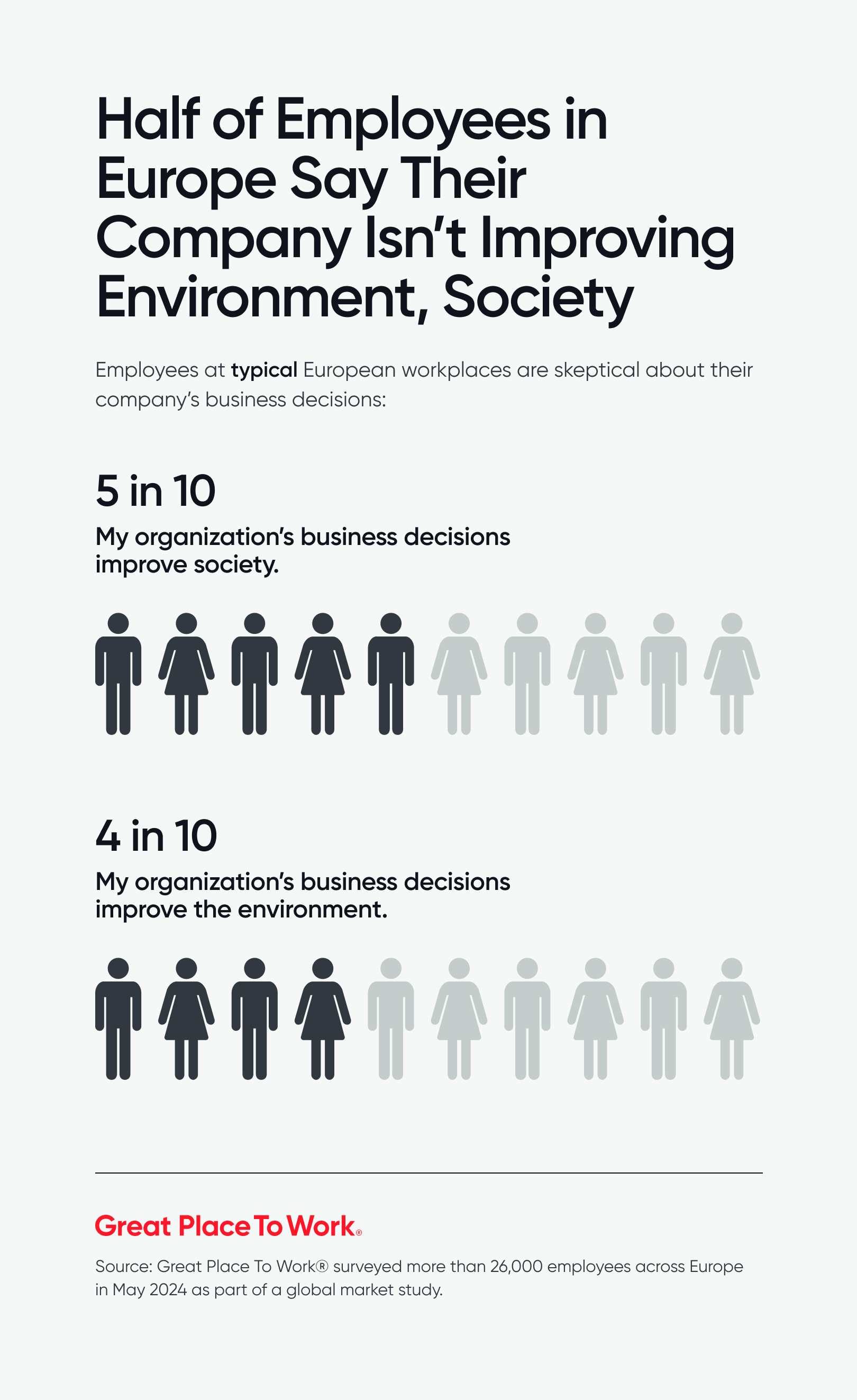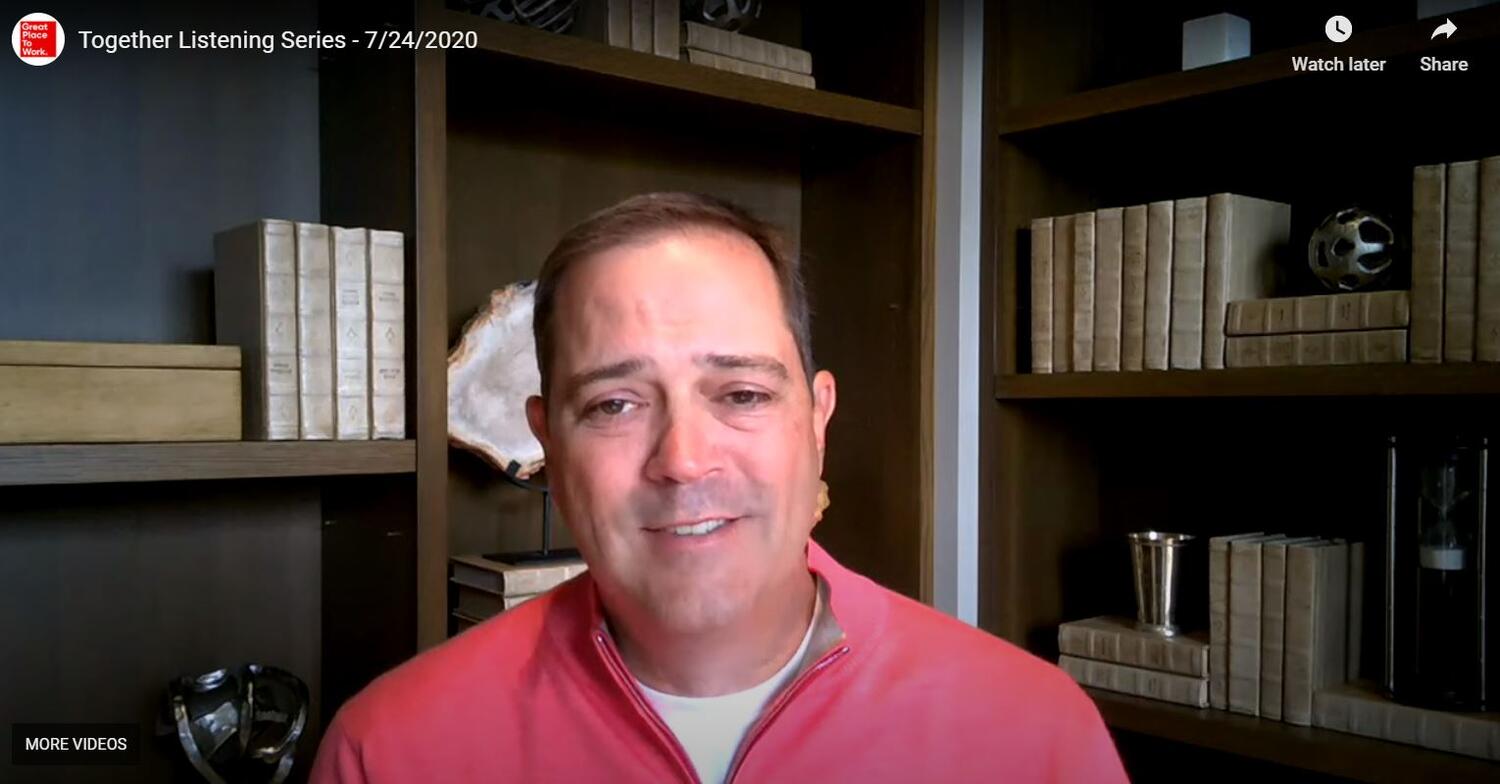Data from the Fortune 100 Best Companies to Work For™ Europe List offers insights on what companies can do to improve sustainability.
Hope is fading for leaders to meet the United Nations’ Sustainable Development Goals (SDGs), a plan crafted to tackle 17 of the world’s biggest problems, from hunger to climate change.
In its 2023 progress report, the UN said measurable progress on the 140 targets in its SDGs was “weak and insufficient.”
In Europe, slow progress is being felt locally, as employees weigh how successful their companies have been driving progress on environmental, social, and governance issues (ESG).
Only 51% of employees at a typical workplace in Europe say their organization’s business decisions improve society and only 44% said their company made decisions that benefit the environment, according to a Great Place To Work® market survey of 26,000 employees in Europe.

That’s a problem for companies in Europe, which must start reporting on their sustainability practices in 2025 under the European Union’s Corporate Sustainability Reporting Directive.
In contrast, companies on the Fortune 100 Best Companies to Work For in Europe list show what it takes to create a great workplace that supports ESG, and are setting the example for others to follow.
What drives employee belief in ESG efforts
How can companies avoid making the mistakes that lead to accusations of “greenwashing”? Your employees will tell you.
Great Place To Work analyzed 60 metrics to understand how the employee experience increases confidence in ESG goals and programs.
The result: Leadership matters.
“It starts with leaders,” says Tony Bond, chief impact officer at Great Place To Work. “Who do you have the ability to influence? The easiest place to start is with the people nearest you — the individuals that make up your organization.”
If leaders can take care of people in their organization, the ripple effect of those actions might finally create the transformation required to meet broader ESG goals.
“It’s unmistakable in our 30-plus years of data,” Bond says. “When employees trust their leaders, they adapt more quickly to change and give extra effort on the job.”
According to Great Place To Work research, employees are:
- 51% more likely to say their company’s decisions benefit the environment, if they believe executives fully embody company values
- 36% more likely to believe their company made decisions that benefit society, if they said leaders were ethical and honest
- 27% more likely to say their organization made decisions that benefit the environment and 28% more likely to benefit society, if they feel celebrated for trying something new, regardless of eventual success or failure
“Trust allows employees to share their ideas, and to notify leaders when the company isn’t living up to its values — perhaps posing a risk to society or the environment,” Bond says. “If you’re not creating a great workplace, you aren’t unleashing the full potential of your people to solve the hard challenges at the root of climate change.”
The 100 Best offer a blueprint
Companies on the Fortune 100 Best Companies to Work For in Europe List show what it takes to create a great workplace that supports ESG.
Great Place To Work surveyed over 1.3 million employees in Europe to identify companies with employees more likely to report the key drivers of confidence in ESG.
At companies on the 100 Best list, eight in 10 employees said their executives fully embody company values, compared to just half of employees at a typical European workplace. Eight in 10 at the winning companies also said people were celebrated for trying something new, regardless of success or failure. At a typical workplace, only five in 10 said the same.
Here are some of the practices that help these winning companies outperform the competition:
1. Tie executive compensation to ESG performance
When leaders have transparent metrics and are held accountable for meeting ESG goals, they build credibility and trust.
At Hilton, in addition to personal performance objectives, leaders’ compensation is linked to metrics that consider how they develop talent, drive engagement, and meet the company’s published ESG goals.
At Salesforce, a portion of variable pay for executives is determined by ESG measures, and with a history of reporting greenhouse gas emissions since 2012, the company has built a track record of trust with both employees and external audiences.
2. Unlock every employee’s ability to give back
Cisco isn’t just focused on how the organization can give back to communities where it operates, it enables employees to give back, with 80% employee participation in its community impact initiatives three years running.
At DHL Express, the global company celebrates Global Volunteer Day with a “follow-the-sun” program where team members can volunteer for 15 dedicated activities sponsored by DHL around the world.
In Europe, ServiceNow has Culture Champion teams that are empowered to create events with local impact, such as removing waste from canals in Amsterdam or picking up garbage from city parks in Milan. Employees also receive 20 hours of paid time off to volunteer, with ServiceNow reporting an 80% year-over-year increase in the hours employees spent volunteering worldwide.
3. Source new ESG ideas from every employee
When employees are actively involved in shaping ESG initiatives, they are more likely to feel connected to the company’s mission, driving both innovation and engagement.
To engage more employees to take responsibility for sustainability and ESG, DHL Express also offers certification to employees who become “GoGreen” specialists and champion sustainable practices in their region. The company’s goal is to certify 80% of its workforce by 2025.
Great workplaces also consider which employee voices are not being heard. At Cisco, a “Women’s Inventor Network” focuses on mentoring and developing women from diverse backgrounds so they can share their ideas and develop solutions to solve needs both in the business and for customers.











